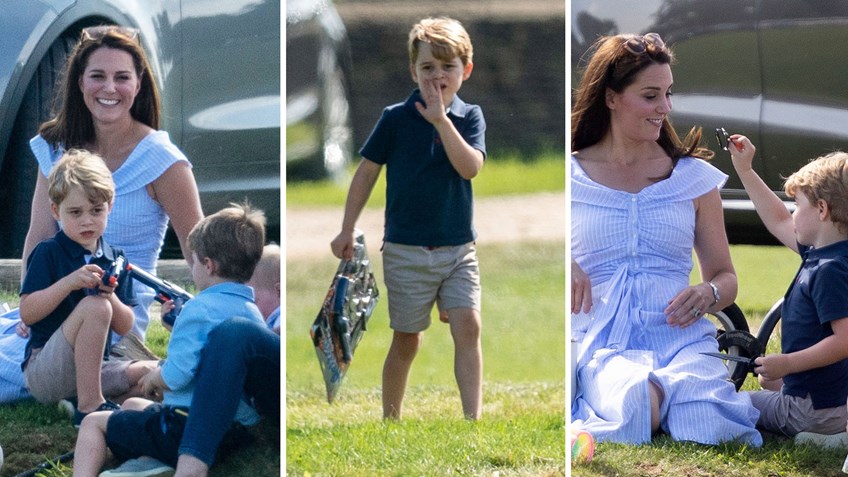Big trouble over the Royal Squirt Gun. Folks, this true! READ MORE
S0URCE: NRA-ILA
The United Kingdom’s legions of miserable-scolds are at it again. A mere two weeks after admonishing an English national team soccer player for a firearm tattoo, the anti-gun whiners have found a new target. This time the killjoys have deemed it their station to lecture the Duke and Duchess of Cambridge on proper parenting.
The sad controversy erupted on June 10, as Kate Middleton, Prince George, and his sister Princess Charlotte watched Prince William participate in the Maserati Royal Charity Polo Trophy in Gloucestershire. During the match, four-year-old George was pictured playing in the grass with an orange-tipped toy revolver and a toy knife. According to an account from Gloucestershire Live, the revolver was a squirt gun the future king won as a carnival prize.
Soon after, the UK’s notoriously loathsome tabloid press got busy stoking a toy gun debate. The Mirror declared, “Outrage as Prince George plays with toy gun and knife on family day out amid surge in violence.” The Mirror cited a Twitter user who saw fit to judge the preschooler and his entire family by stating:
“Sad to see George playing with a gun when the whole country has a gun/knife crime situation. Maybe in training for killing wild life in later years. Thought he was a sensitive child. Better if he was seen playing with a toy car or football. Sadly the royals will never change.”
Another tweeted, “This isn’t okay anymore…” adding, “No child in this day and age should look at any gun as a fun toy.”
Thankfully, some of the more sensible UK subjects have come to the royals’ defense with the facts. The Independent interviewed trained UK Psychotherapist Sarah Ockwell-Smith who explained:
“I understand why gun play worries parents, however research shows that any aggression demonstrated while engaging in ‘war play’ is not carried over into real life. ie: kids who play with guns become no more violent than those who don’t.”
Then adding:
“…even if parents restrict gun-toys, it incredibly likely that children will fashion their own, from a stick for instance. For this reason, combined with the evidence, I see no issue with letting children play with guns and happily allowed my own children to do so.”
This is similar to what U.S. experts have said and written on this topic. Moreover, as NRA-ILA has previously reported, concerns about toy guns appear to be rooted more in the political prejudice of adults rather than any legitimate concern for childhood well-being.
When clinical psychologist and best-selling author Michael G. Thompson, Ph.D. was interviewed for a WebMD article titled, “Toy Guns: Do They Lead to Real-Life Violence?,” he explained, “There’s no scientific evidence suggesting that playing war games in childhood leads to real-life aggression.” University of Nevada Las Vegas researchers Jennifer L. Hart, M.Ed and Michelle T. Tannock, Ph.D. addressed this matter in a chapter on aggressive play and war toys for the Encyclopedia on Early Childhood Development. The pair wrote, “If playful aggression is supported, it is highly beneficial to child development.” Going further, the researchers noted, “Educators who hold a foundation of understanding will be better able to communicate the importance of not only allowing playful aggression but also supporting it with the inclusion of war toys in early childhood programs.”
Rather than criticize the royals’ parenting, or wholesome fun with a water pistol, a more reasonable course of action might have been to commend the royals as role models for outdoor play. The Centers for Disease Control has noted, “Research increasingly suggests that children benefit from the opportunity to play outdoors, where they can explore and enjoy natural environments.” A 2012 survey of the research on outdoor play published in the journal Health & Place explained, “encouragement of outdoor play and fostering an environment of movement among children improves the physical, emotional, social, and cognitive health of children…”
Much like in the U.S., polling shows UK children are not getting outside enough. According to the Guardian coverage of one 2016 poll, “three-quarters of UK children spend less time outside than prison inmates.” A 2016 UK government study found that more than 10 percent of UK children had not been to a natural environment (including urban parks) in the past year. A 2016 survey from the UK’s National Trust found that the country’s children spent only half as much time playing outside as their parents did.
If history is any guide, this won’t be the last time Prince George or the royals face firearms-related criticism. Despite the family’s significant conservation efforts, animal rights activists have targeted the royals for their proud hunting tradition. In 2016, anti-hunting critics took issue with Prince William’s articulate defense of big game hunting. Prince Philip and Prince Harry have also been the targets of anti-hunting animus.
Given the political disposition of many of his future subjects, Prince George can probably expect a lifetime of criticism should he follow his family into the shooting sports. On a positive note, the four-year-old already appears to be more mature than his most vocal detractors.









